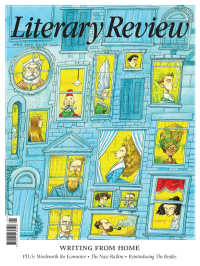Emma Park
Porkers & Pissheads
The Pig War
By John Placentius (Translated from Latin by Michael Fontaine)
Paideia Institute 67pp $20
How to Drink: A Classical Guide to the Art of Imbibing
By Vincent Obsopoeus (Translated from Latin by Michael Fontaine)
Princeton University Press 285pp £13.99
It is a curious fact that nearly all surviving literature in Latin was written not in the Roman Empire but in early modern Europe. Renaissance humanists, in particular, wrote in serious Latin (usually prose) about philosophy, science, history and theology, and then, in their spare time, fashioned elegant Latin poems, often on frivolous subjects. These literary ‘trifles’ (nugae) were reprinted enthusiastically for generations but declined in popularity in the 19th century, when they were castigated by philological purists for their artificiality, lack of authenticity, and bad grammar. Since then, most of them have been languishing in the deepest stacks of research libraries.
Two such trifles, both with standardised spelling and facing English translations, have now been republished by Michael Fontaine, a professor of classics at Cornell who is an advocate for making the study of Latin enjoyable. The Pig War, or Pugna Porcorum, was composed by a minor humanist known by his Latin moniker, Placentius, a Dominican monk who studied at the so-called College of the Pig at Louvain University. In 1530, he moved to Antwerp and published The Pig War. This poem has the dubious distinction of being one of the earliest surviving examples of a tautogram: a text, usually in verse, in which every single word begins with the same letter.
The opposing parties in Placentius’s The Pig War are the fat hogs (porci) and the small but ambitious piglets (porcelli). A fight begins after the piglets object to the way in which the hogs ‘hog’ all the social privileges. The piglets win the first round and, after negotiations with the

Sign Up to our newsletter
Receive free articles, highlights from the archive, news, details of prizes, and much more.@Lit_Review
Follow Literary Review on Twitter
Twitter Feed
Under its longest-serving editor, Graydon Carter, Vanity Fair was that rare thing – a New York society magazine that published serious journalism.
@PeterPeteryork looks at what Carter got right.
Peter York - Deluxe Editions
Peter York: Deluxe Editions - When the Going Was Good: An Editor’s Adventures During the Last Golden Age of Magazines by Graydon Carter
literaryreview.co.uk
Henry James returned to America in 1904 with three objectives: to see his brother William, to deliver a series of lectures on Balzac, and to gather material for a pair of books about modern America.
Peter Rose follows James out west.
Peter Rose - The Restless Analyst
Peter Rose: The Restless Analyst - Henry James Comes Home: Rediscovering America in the Gilded Age by Peter Brooks...
literaryreview.co.uk
Vladimir Putin served his apprenticeship in the KGB toward the end of the Cold War, a period during which Western societies were infiltrated by so-called 'illegals'.
Piers Brendon examines how the culture of Soviet spycraft shaped his thinking.
Piers Brendon - Tinker, Tailor, Sleeper, Troll
Piers Brendon: Tinker, Tailor, Sleeper, Troll - The Illegals: Russia’s Most Audacious Spies and the Plot to Infiltrate the West by Shaun Walker
literaryreview.co.uk